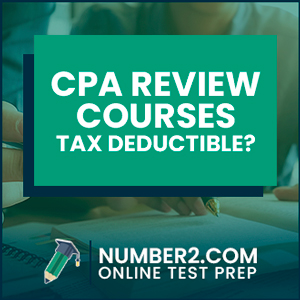 The CPA journey is an expensive one. Regardless of whether you are a college student or an accounting professional looking to further your career, getting your CPA license isn’t cheap. Between college, prep courses, exam fees, and application costs becoming a CPA is expensive.
The CPA journey is an expensive one. Regardless of whether you are a college student or an accounting professional looking to further your career, getting your CPA license isn’t cheap. Between college, prep courses, exam fees, and application costs becoming a CPA is expensive.
So, you might ask yourself, are CPA review course expenses and fees tax deductible? After all, this is a prep course for an exam that you most likely have to take for your job. Unfortunately, the IRS has heard several cases on this topic and concluded that review courses are non-deductible because they are personal expenses.
After all you aren’t in the business of becoming a CPA.
Let’s check out a few different reasons why you can’t deduct CPA review expenses on your tax return.
Can I Deduct CPA Review Course Expenses on My Tax Return?
No, a CPA review course is not tax deductible because the IRS deems it to be a personal expense and does not treat it like a qualified education expense or a non-reimbursed business expense.
Here are two ways to look at the cost of a CPA review course:
- Educational expense
- Unreimbursed business expense
Both of these will come under different sections of your Form 1040 and will get entirely different treatment under the tax laws. Let me explain further how it comes under each category.
Is It Possible To Deduct CPA Review Expenses On Your Tax Return?
Are CPA Exam Review Costs Deductible As Educational Expenses?
As per the US tax laws, the educational expense can get a deduction on the first page of Form 1040. But the IRS publication 970 that defines the tax benefits of education does not put the cost of buying the study material for CPA as an educational cost or even a work-related study expense.
As per the IRS, the education expenses that get the tax benefit are tuition fees and enrollment and attendance fees at a qualified educational institute.
But since you are not required to enroll for a CPA course at an institute and neither is the CPA review course guide company a qualified educational institute, you do not benefit from it under the educational expense of the tax deductibles.
The IRS further states that an educational expense, which may also include the cost of research done as part of the curriculum, can be deducted as a necessary education expense even when you get a degree for it. The points that have to be considered here are:
- The educational qualification is helping you maintain or improve the skills required for your present business or profession.
- The educational qualification is in terms of your employer’s agreement. Or it may be the requirement of the law as a condition of retention, a position, or a rate of compensation.
You can benefit from deductions of your educational expense when it improves the skill required to maintain your present employment, job level, or pay level. The challenge is to prove to the IRS, with supportive documentation, that your educational expense is necessary to your employment.
Since a CPA course does not meet the criteria mentioned above, it is termed as a non-deductible personal expense.
Are CPA Review Course Fees Deductible as Unreimbursed Business Expenses in Itemized Deductions?
The IRS states that you can claim a tax deduction on the education required to keep your job if the company you are employed with is not paying for it.
So, if you have a job and the employer wants you to get an educational qualification to keep the employment, you can claim deductions under the tax laws. This is when you are personally bearing the cost of the education, and it is not reimbursed by the company you work in.
But in no case can you get tax deductions to prepare a course that qualifies you for a new business or profession that passing a CPA exam does. A CPA can legally undertake many additional services that an accountant cannot.
There has been an argument that a person may wish to keep his previous job even after completing a CPA course and not undertake any new CPA-related services. In this case, the court has established that one may not get exemptions on their intention. When the education qualifies you for a new job role, you cannot seek an exemption under the tax laws.
The US tax law (Pub 970) that defines the tax benefits for education states that the material required to study for the CPA exam is not a work-related educational expense. Therefore, it cannot be tax-deductible. A CPA course review material is used to prepare you for a new job or business.
The IRS has also compared a CPA and a lawyer who has completed his bachelor’s degree but needs to study one more year to be eligible for full-time employment. The additional one-year study cost is required to meet the eligible profession criteria, but it still comes under a non-deductible educational expense.
Furthermore, the job of a CPA is very different from an accountant (non-CPA). The course prepares you for a new business or profession, and therefore the expense of it is non-deductible under US educational tax deductions.
A CPA course will prepare you for a very different profession or job. It is not related to your current job and profession on which you can claim tax deductions as an unclaimed business expense.
FAQ
Is CPA exam reimbursement taxable?
Yes, CPA exam reimbursement provided by an employer is generally considered taxable income. It is subject to federal income tax and, in most cases, state and local taxes as well.
Are Exam fees tax-deductible?
Yes, exam fees for professional certifications, including the CPA exam, can be tax-deductible if they are required to maintain or improve skills in your current job. However, certain conditions and limitations may apply, so it’s advisable to consult a tax professional for specific guidance.
Are CPA exam fees covered under the Lifetime Learning Credit?
No, CPA exam fees are generally not covered under the Lifetime Learning Credit. This credit primarily applies to eligible educational expenses related to post-secondary education, rather than professional certification exams.

